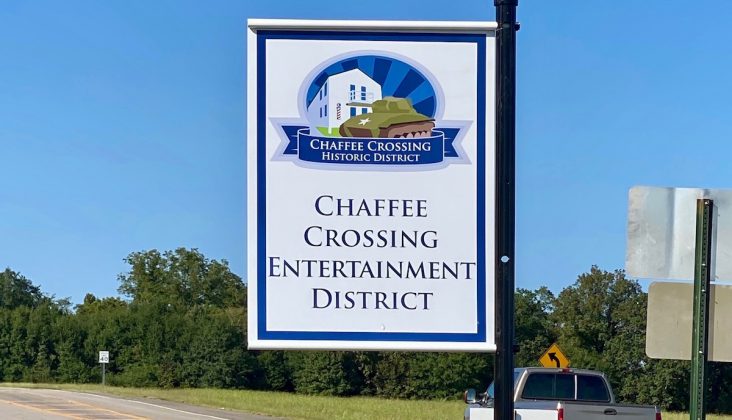Developers respond to FCRA lawsuit, allege retaliation and deceptive practices
by August 29, 2024 4:31 pm 337 views

Developers included in a lawsuit filed in July by the Fort Chaffee Redevelopment Authority (FCRA) have filed a counterclaim saying FCRA engages in deceptive practices and the original lawsuit was filed for retaliation against developers speaking out against the trust.
A lawsuit was filed July 12 in Sebastian County Circuit Court against Gift Monkey Properties LLC, RSMJ LLC, Steve Beam, Rod Blake and Justin Green. Gift Monkey Properties and RSMJ are owned by Beam, Blake and Green.
The lawsuit focuses on conveyance of property on Fort Chaffee Boulevard from Gift Monkey Properties to RSMJ that was not approved by the FCRA. In October 2020, Chaffee Commercial Properties, which has the same owners as the other two businesses, and the FCRA entered into a contract. Chaffee Commercial Properties bought the property for $50,000 and agreed to construct a retail/office development on the property, the lawsuit states. The property was conveyed to Gift Monkey Properties in March 2021 without the knowledge of FCRA, the lawsuit states. However, when FCRA learned of the conveyance, they retroactively approved it.
The property was then conveyed to RSMJ in February 2023. The subject of the conveyance was broached earlier this year. At that time, the owners said the conveyance was done for convenience reasons in accounting. But the property received more than one extension on the development clause of the contract under the name Gift Monkey Properties after the conveyance.
Dalton Person, FCRA attorney, said that while the property was still owned by the same people, the new business entity involved has significant differences. Because extensions for development were requested and given to Gift Monkey Properties when that company did not own the property is what led to the fraud allegations, Person said. The lawsuit states that under paragraph 10 of the contract, the property owner was required to give the FCRA written notice prior to conveying the property so the FCRA could exercise its right to repurchase within 45 days of receiving the notice of sale if it so wished. Therefore the court should declare the conveyance null and void, it says.
In their response to the lawsuit, filed Monday (Aug. 26) by the group’s attorney Marshall Ney, the defendant’s state that the complaint should be dismissed for failure to state facts upon which relief can be granted. They state that FCRA has suffered no damages as a result of conveyances of the property. They state that the restrictive covenants relied upon by FCRA are disfavored under the law and are against public policy. They also state that the requested relief in the original lawsuit is unconstitutional under the due process clause of the Fifth Amendment, the Fourteenth Amendment and under any applicable state law.
The defendants state that they have fully performed their obligations under their contract or that any failure to perform was excused. The defendants said FCRA was aware when the original contract was signed that the property would be conveyed to Gift Monkey for internal purposes and that all members of the LLC were the same as those of Chaffee Commercial Properties. They said the additional conveyance by Gift Monkey to RSMJ LLC, which includes the same members and was done on the advice of their accountant, should be just as acceptable as the prior conveyance.
The group included a counterclaim in its answer to the lawsuit, stating that the problem is that FCRA has consistently acted arbitrarily, capriciously, and in self-interest of its leadership.
“This Counterclaim arises from the FCRA’s imposition of unreasonable and overly-restrictive covenants on land transactions and its failure to honor contractual obligations, actions that contravene its mandate to operate in the public interest,” the counterclaim states.
The plaintiffs also state in the counterclaim that FCRA has engaged in deceptive trade practices by enticing property buyers with promises regarding the development of Chaffee Crossing as outlined in the Historic District Plan.
“FCRA has made minimal or no effort to implement the improvements necessary to support the area’s development. This pattern of misleading conduct has unfairly induced purchasers into agreements with the FCRA and exacerbated the financial and operational burdens imposed by the FCRA’s restrictive covenants,” the counterclaim states.
In their lawsuit, FCRA states that they should only have to pay $50,000, the original purchase price of the property, to repurchase the land and questioned the defendant’s claim for approximately $121,000 in improvements made to the property. In their answer, the defendants say that in the event the property must be repurchased, FCRA is contractually responsible for the cost of any improvements made to the property.
“Despite clear contractual terms requiring such reimbursement, the FCRA has refused to provide the required repurchase price. This breach has caused significant harm to Counterclaim-Plaintiffs, who relied on the FCRA’s commitment to honor its contractual obligation,” the filing states.
